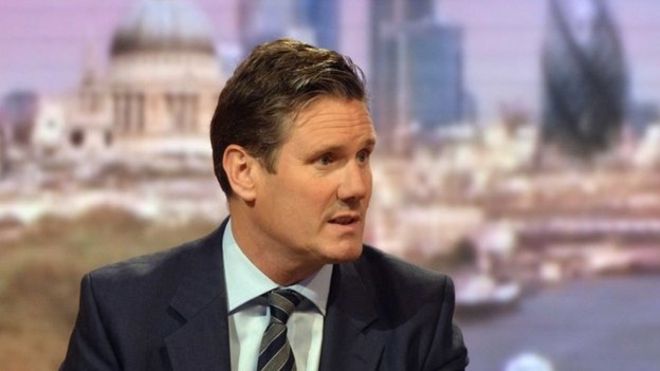Labour has made a dramatic shift in its Brexit strategy, pledging to oppose any Conservative plan that would involve a sudden exit from the customs union and the single market.
Writing in the Observer, Keir Starmer, Labour’s shadow secretary of state for exiting the EU, said Labour would seek a transitional phase of several years during which the UK would retain similar trading arrangements to what we currently have.
‘Labour would seek a transitional deal that maintains the same basic terms that we currently enjoy with the EU. That means we would seek to remain in a customs union with the EU and within the single market during this period. It means we would abide by the common rules of both,’ he wrote.
‘That is a choice Liam Fox and Philip Hammond explicitly ruled out a fortnight ago, stating that Britain would be outside the customs union and the single market in any transitional phase. Labour rejects that as an unnecessary and highly risky path to take.’
‘By remaining inside a customs union and the single market in a transitional phase we would be certain that goods and services could continue to flow between the EU and the UK without tariffs, customs checks or additional red tape. There would be no need to set up complex alternative customs or trading relations. Given that UK-EU combined import/export trade totalled £553bn last year, this certainty would be hugely advantageous for British businesses and consumers. This arrangement would also safeguard the important social protections and rights that come from being within the single market,’ wrote Starmer.
‘There are a number of other significant advantages to this approach. First, it is a grown-up acknowledgement that bespoke transitional arrangements are highly unlikely to be negotiated, agreed and established in the next 18 months. Second, it provides maximum certainty for businesses and allays concerns that there will be delays or disruptions to trade when we leave the EU in March 2019. It would also ensure there will be a one-step transition to a new final relationship.’
Previously Labour’s position on Brexit has been very similar to the Conservatives, and Jeremy Corbyn did not oppose the Government when it voted to trigger article 50 earlier this year, beginning the two year process of leaving the EU.
The decision to put clear water between the two main parties means MPs will now have a distinct choice when voting on which strategy to pursue in the House of Commons.


